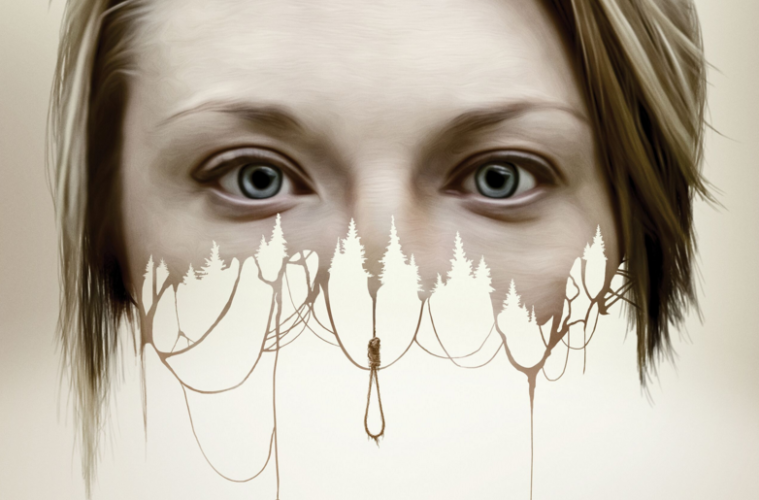Coming after Gus Van Sant’s critically torpedoed Sea of Trees, The Forest is the second recent movie to be set in Aokigahara, the mythic forest located at the base of Mt. Fuji, which has come to be known as the Suicide Forest. It’s a natural monument of cultural and historical significance in Japan’s history, and now, its own repeating ghost story as individuals return there with the express purpose to end their life.
That’s the thematic undercurrent for Jason Zada’s The Forest, a movie that attempts to capitalize on Aokigahara for a story of shared horror, but mostly just settles on a disposable ninety minutes of monster closets and diminishing sanity. As the story begins, Sara (Natalie Dormer) abruptly wakes up, feeling a mysterious disturbance with her twin sister despite being thousands of miles away. She impulsively hops on a flight to her sister’s last known location, Tokyo.
Sara and Jess’ connection as twins is mostly a writerly convenience, condensed to vague dialogue about an inexplicable psychic connection, and the shared loss of their parents. Sara patly and prophetically refers to their dynamic as “She looks at the dark stuff, I turn away.” That theme lies at the margins of the script, but in the moment of the scares, it’s primarily an excuse for Sara to unravel before the audience’s eyes.

Sara and Jess align neatly into dichotomies of light and dark with Dormer playing Sarah as the straight-laced but necessarily intense sister, and Jess as the edgy black sheep. Jess has a romance with the darkness, digging deep into her sadness over her parent’s loss while Sara copes with tunnel vision. Luckily, Sara is told over and over in exposition that the titular forest specifically preys on undigested sadness, guaranteeing that she will re-live the personal trauma that’s been behind mental lock and key.
Zada doesn’t treat this event lightly, leaning into it with a visually striking flashback that establishes Sara with understandable unreliability, and then spending the latter half of the movie forcing Dormer through an emotional grinder. After scene-stealing roles in Game of Thrones and The Hunger Game series among others, this is another attempt to coronate Dormer as a lead. It’s unlikely that she’ll wrest away the current title of scream queen from Maika Monroe, especially when her performance in The Forest feels flattened to the point of sounding like one of the Stepford Wives.
That can partly be blamed on the choice to cast the Reading-born Dormer in the role of two Americans, which saps so much of her energy that her usual slyness is all but sanded away. But it’s also just not a very compelling character. Sara is a devoted investigator, even if her judgment is far from bulletproof, but she has woefully little to do besides poke around in the dark with her cell phone until something terrible happens.

Worse, this is yet another American horror movie that draws on xenophobic assumptions to build scares. Whether it’s successful or not, J-horror has a storied, personal engagement with Japan’s mythic interpretations of the afterlife and the karmic relationship between the living and the dead. The Forest doesn’t earn this association, instead communicating the country’s fascination and fear with the dead through regurgitated exposition from Japanese character.
And that’s after the movie has already made a point of alienating the Japanese culture through gawking cutaways of cosplayers on a street corner, and scene of Dormer eating live sushi to the chagrin of people around her. This is yet another horror movie that destabilizes the main character through her ignorance about cultural traditions.
After nearly endless table setting, the story finally finds a way into the forest through the introduction of a dreamy but suspect Aiden (Taylor Kinney). Along with an interesting but thinly sketched ranger (Yukiyoshi Ozawa), he’s her constant forest companion, a worldly travel reporter who changes his particulars and curls his eye brows just enough to seem a bit shifty.
Sara is an ideal protagonist for evil spirits, stupidly following every cracked twig and surreal howl until she’s so wrapped so tightly around the finger of the titular forest that every subsequent character choice is just a series of domino effects.

From there, The Forest metes out its frights like a finely tuned machine with highly segmented, telegraphed jump scares that stew quietly on a timer until bursting forth. They’re capably staged comfort food — particularly one involving a viewmaster that feels clearly influenced by the music box sequence of The Conjuring — but they’re also exceedingly safe down to the progression of a fake out in the first fifteen minutes. And other than a late twist that flips the script, every beat here from dalliances into body horror, creepy crawlies, and mental instability feels skin-deep.
James Wan’s lunging familiars and J-horror’s simmering wraiths are an obvious point of reference for The Forest’s tattered, otherworldly avatars, but they still deserve credit from a production standpoint. With their enticing grins and demented heel turns, their mutations aren’t covered in shadows, but fully visible. For Sara and the audience, they’re a physical manifestation of loss — unfulfilled destinies and forgotten souls come to life.
Released in the dead zone of January, The Forest is a nonsensical, moderately well-made trifle, but with a lead who’s on the cusp of movie stardom, and a photogenic, mythical setting with a history that’s far more unsetting than any of the jump scares in the movie, it could have been so much more.
The Forest is now in wide release.

